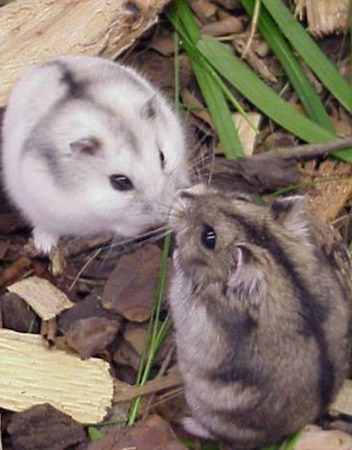Study: Hormone Controls Seasonal Sex

A brain hormone linked to the onset of puberty in teens also appears to turn down the Siberian hamster's libido and reproduction during winter months, scientists report.
This is the first study to link kisspeptin hormone with how animals interpret seasonal cues, such as day length, to spike reproduction when conditions are optimal and put on the brakes during tougher times.
The results do have some implications for understanding human reproduction. "Studies in humans have shown that individuals with deficits in the receptor for kisspeptin have severe reproductive impairments," said study team member Gregory Demas of Indiana University in Bloomington.
Whether humans experience seasonal shifts in reproduction is unknown, but the Centers for Disease Control and Prevention (CDC) report that fertility rates in the United States decrease in autumn. So the jury's still out on any role played by kisspeptin.
"In humans and other species, if the environment is not satisfactory, sex drive will decline; kisspeptin is likely part of the pathway responsible for this regulation," said study team member Lance Kriegsfeld of the University of California, Berkeley.
Summer lovin'
Siberian hamsters show strong seasonal habits regarding sex, with an upsurge of breeding in summer months and a decline as winter approaches. The distinct breeding seasons make the hamster a good model for studying triggers of reproduction.
Sign up for the Live Science daily newsletter now
Get the world’s most fascinating discoveries delivered straight to your inbox.
Scientists led by Timothy Greives of Indiana University divided a population of male Siberian hamsters (Phodopus sungorus) into treatment groups: those housed in summer-like conditions with 16 hours of light followed by 8 hours of dark, and those in winter-like conditions with 8 light hours and 16 dark hours.
After eight weeks, they found hamsters in wintry conditions experienced marked reductions of kisspeptin in a critical brain region important for regulating reproduction and sex behavior compared to hamsters in simulated summer conditions.
Plus, animals kept in long-day conditions had much heavier testes, higher body weights and more testosterone compared with their short-day cousins.
Wake-up call
In a separate experiment, hamsters were kept in winter or summer conditions for eight weeks and then given an injection of kisspeptin.
The winter hamsters were just as responsive to kisspeptin, showing the same increase in a key hormone called luteinizing hormone as summer hamsters. This suggests kisspeptin can turn on the reproductive switch even in the presence of cues signaling a winter.
Recent research by scientists in the United Kingdom and France have shown human kisspeptin triggers the release of hormones such as luteinizing hormone, which is important to puberty and other sex-related functions. For instance, in women, a surge in this hormone triggers ovulation, whereas in men it stimulates the production of testosterone.
Next, the scientists want to look at how other factors, such as temperature, could impact this brain hormone in the animals. Perhaps, Dumas said, there are human counterparts to these factors, including stress and malnutrition, that regulate the hormone and human reproductive success.
- Amazing Animal Abilities
- The Sexiest Stories of 2006
- The Weirdest Science Stories of 2006
- Mating Game: The Really Wild Kingdom
- Life's Little Mysteries: Why do Men Have Nipples?
Jeanna Bryner is managing editor of Scientific American. Previously she was editor in chief of Live Science and, prior to that, an editor at Scholastic's Science World magazine. Bryner has an English degree from Salisbury University, a master's degree in biogeochemistry and environmental sciences from the University of Maryland and a graduate science journalism degree from New York University. She has worked as a biologist in Florida, where she monitored wetlands and did field surveys for endangered species, including the gorgeous Florida Scrub Jay. She also received an ocean sciences journalism fellowship from the Woods Hole Oceanographic Institution. She is a firm believer that science is for everyone and that just about everything can be viewed through the lens of science.










